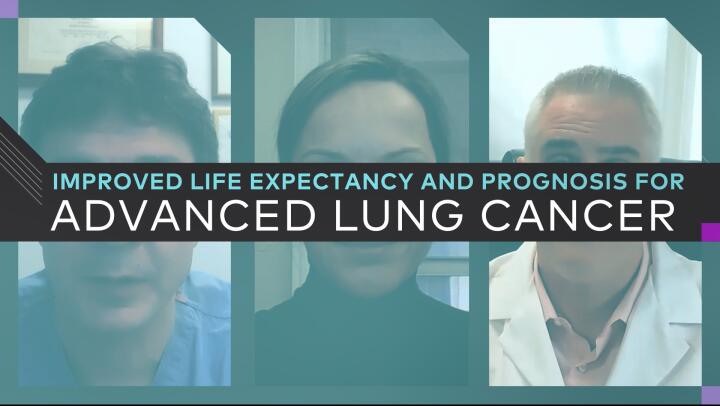
Stage 3 non-small cell lung cancer (NSCLC) is tricky. Although NSCLC is the most common type of lung cancer, it’s hard to detect in its early stages. Approximately 30 percent of those affected are at stage 3 at the time of diagnosis, meaning the cancer has spread from the lungs to lymph nodes in the middle of the chest or other nearby areas.
Treating stage 3 lung cancer can be challenging too. There is a great deal of variability from case to case, so there isn’t one treatment strategy that can be used across the board. Instead, it needs to be tailored to the specific individual. Most people with stage 3 NSCLC will receive multiple forms of treatment over the course of the disease.
If you have stage 3 lung cancer, you can expect to receive some of the standard forms of cancer treatment like surgery, chemotherapy and radiation. You will likely have a team of doctors who specialize in each form of treatment. To determine the most appropriate route to take, they will look at:
The size and location of your tumor(s)
The location of the affected lymph nodes
Your overall health
Your response to previous treatments
In many cases, treatment will begin with chemotherapy, often along with radiation if your doctor thinks you can tolerate it. Chemotherapy uses cancer-killing medication that’s injected into a vein or taken by mouth. Since chemotherapy enters the bloodstream it can be tough on the rest of the body, so it’s given in several cycles, consisting of treatment days followed by rest days. A combination of 2 different types of chemotherapy are often used. Side effects include hair loss, nausea and vomiting, and fatigue.
Radiation therapy precisely directs strong beams of energy at the cancer cells in an attempt to destroy them. The treatment itself is painless, similar to getting an x-ray. It’s usually given 5 days a week for several weeks in a row. Radiation may be used alone in patients who are not good candidates for chemotherapy. It may lead to fatigue, loss of appetite, and skin changes in the treated area. You may experience sore throat or difficulty swallowing if the radiation affects your esophagus.
Surgery to remove lung cancer is difficult, especially in more advanced stage 3 cases because of the proximity to other vital organs in the chest. Sometimes surgery is performed right away; sometimes chemotherapy and radiation may be used first to try and shrink the tumor, so surgery can be performed later. Other times, surgery is simply not an option. Chemotherapy and radiation may also be used after surgery to kill any remaining cancer cells and to minimize the chance of it coming back.
Even with standard cancer treatments, stage 3 non-small cell lung cancer is rarely curable and doesn’t boast great long-term survival rates, so there has been a big push to develop more effective treatment options. In recent years, researchers have learned more about what’s happening with cancer cells at the cellular level and how our immune system works. This has led to growth in two exciting areas of lung cancer treatment:
Targeted therapy: By identifying what makes cancer cells different than normal cells, treatments have been developed that “target” those differences and stop the cancer cells from growing. Your cancer cells can be tested specifically to see if you have any of these targets, often in the form of gene mutations or proteins, and if so, you may be a candidate for this therapy. Many types of targeted therapy are given as a pill you can take at home. It may be used in conjunction with certain types of chemotherapy or in cases where chemotherapy hasn’t been effective.
Immunotherapy: Your immune system is designed to recognize and destroy harmful things like viruses and bacteria. However, cancer cells can sometimes “disguise” themselves so they are able to evade the immune system attack. Immunotherapy essentially helps “unmask” the cancer cells, so the immune system can find and eliminate them. Durvalumab (Imfinzi) was recently the first approved immunotherapy treatment for stage 3 NSCLC.
Many forms of targeted therapy and immunotherapy are approved for stage 4 lung cancer, where the cancer has spread to distant parts of the body, but may also be available as part of a clinical trial for stage 3 lung cancer. Clinical trials are necessary for researchers to learn more about new treatments and may present an opportunity to receive access to some cutting-edge therapies. Talk to your doctor if you’re interested in participating in a clinical trial, and he or she can explain the risks and benefits of any potential new treatment.
Rather than attempt to cure your cancer, some treatments are designed to help you cope with side effects and discomfort that you may experience as a result of lung cancer. Palliative treatments, also called supportive treatments, can be used throughout your treatment process, not just in the end stages of life as often believed. Treatments to keep you comfortable include:
Treatments to make it easier to breathe, like extra oxygen or radiation to shrink a tumor obstructing your airway
Pain medicine
Nutritional supplements
Anti-nausea medication
Counseling
Massage
No matter what lung cancer treatment you are undergoing, it’s important to remember to always take an active role in your healthcare. Your physical and mental well-being will benefit greatly as a result.

















